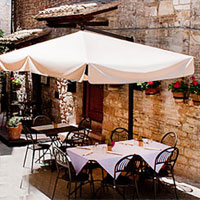Chesterton imagines how news of the resurrection first filtered through to Rome, which 2,000 years ago was the centre of the world.
The members of some Eastern sect or secret society or other seemed to have made a scene somewhere; nobody could imagine why. One incident occurred once or twice again and began to arouse irritation out of proportion to its insignificance. It was not exactly what these provincials said; though of course it sounded queer enough. They seemed to be saying that God was dead and that they themselves had seen him die. This might be one of the many manias produced by the despair of the age; only they did not seem particularly despairing. They seemed quite unnaturally joyful about it, and gave the reason that the death of God had allowed them to eat him and drink his blood. According to other accounts God was not exactly dead after all; there trailed through the bewildered imagination some sort of fantastic procession of the funeral of God, at which the sun turned black, but which ended with the dead omnipotence breaking out of the tomb and rising again like the sun.
Eating and drinking God? Rising from our graves just as Jesus rose from his? These claims are utterly fantastic. It’s no wonder atheists like Richard Dawkins laugh at them. They are laughable. But they’re not irrational. The Christian faith is internally coherent, and though its claims can’t be scientifically proven, nor can they be disproven.
Our faith isn’t irrational, but it is fantastic. And I think Chesterton is right when he says it wasn’t these claims which caused the stir, but the way these claims were made. What was true then, is true now. Doctrine alone won’t attract people to Christ; the joy of Christians will attract them.
We should relish the joy of the Resurrection always, but especially now. A good way to foster joy, I think, is to treat Easter a bit like Lent. For the forty days of Lent, we gave up something. For the fifty days of Easter, perhaps we can take up something.
So, for example (and here I’m indebted to ePriest), on the Sundays of Easter we could invite a different friend to cooked breakfast — and include an invitation to join us at Mass. Or a family could agree to get together each week in Easter for a DVD night.
Through these sorts of ‘Easter resolutions,’ we foster joy and also be apostolic. And Easter resolutions are faithful to the eschatological horizon of Easter. The resurrection isn’t restricted to a single time and place; the world has changed, and us with it. As Chesterton (again so inimicably) wrote:
On the third day the friends of Christ coming at daybreak to the place found the grave empty and the stone rolled away. In varying ways they realised the new wonder; but even they hardly realised that the world had died in the night. What they were looking at was the first day of a new creation, with a new heaven and a new earth.





Good to have you back on-line Father John. Careful with that delete key in future.
Regards
John H
Finally! He’s back! I was having withdrawal symptoms (LOL kidding!)
Great post by the way, I was just the other day thinking similar thoughts about how unbelievable it all seemed…
So, what happened to the blog?!
Thanks fellas. There’s still a few teething problems, even now, but I think the frontend is now stable. And, on the bright side, I’ve now become an expert on what not to on WordPress. Better to stuff up my personal blog, than the myriad of official websites I have designed and maintain!
Hello Father John good to see your blog up and running again just before Hamilton and Warrnambool Racing Carnivals.
Happy Easter to you and all friends and Happy Greek Easter for this weekend.
Thanks Pieman. Happy Easter! Do you celebrate it twice at your place, or does the Irish in you win out?
We do try and not eat meat on Greek Good Friday.
Mum does make the red eggs. We crack them on Sunday. Mum makes a Greek soup for Christmas Day, New Years Day and Easter and Greek Easter. It has chicken, lemon, egg and rice in it. If your egg is not crack then that means good luck for the rest of the year. Grandma made some Greek Easter bread too. Grandma use to make pastry for New Years Day cheese and meat one. She use to put 5 cents in the meat one and if you find that your lucky for the rest of the year. We use to give a red egg to Fr. Greg Tait. Do you have many Greek friends Fr John? I am sure hear about the Greek fireworks in the next couple of days in the news. We also have roast lamb too and last week for Australian Easter we had roast lamb and roast turkey for desert we had choclate ripple cake and trifle. We are very lucky that we can eat all this in Australia.